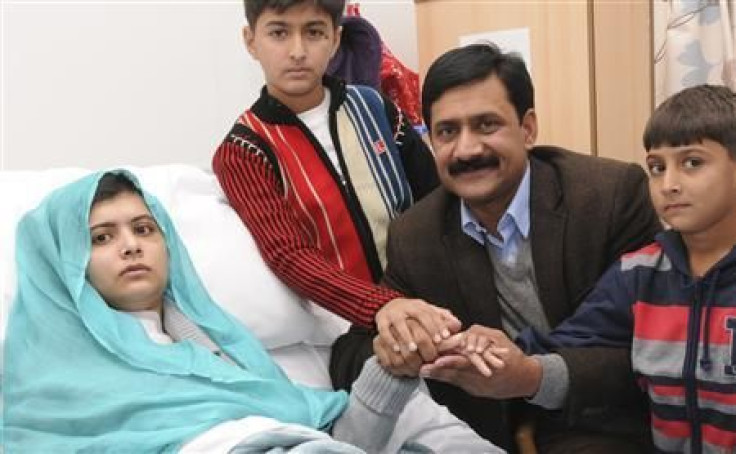Malala Yousafzai To Live Under Security For Life, As Movement Swirls To Nominate Her For Nobel Peace Prize

Malala Yousafzai, the Pakistani teenage girl who has become a global icon in the fight against terrorism and an advocate for women’s education, will live under heavy security for the remainder of her life, according to the country’s interior minister.
Rehman Malik told The Daily Telegraph while visiting Delhi, India, that Malala will be in constant danger from militants once she returns to Pakistan, thereby necessitating the extraordinary security measures for a private (but now very famous) citizen.
Malik also said the controversial decision to rename a girls’ school in Mingora in the Swat Valley after Malala will remain in place, despite protests by local students that such a provocative step will only anger militants and make the building a target of terrorist violence.
"When I visited her school I was the first one to propose that school [take] her name and I met the students there, the girls there, and they all clapped when I announced that. So I don't think this is an issue at all," Malik said.
"The people of Mingora and Swat and Pakistan as a nation owe this much to her, so there will be no change of position and the school will continue to be in her name."
However, about 120 pupils at the school demanded that the school restore its prior name, boycotting classes and tearing up posters of Malala in protest.
"We want the government to remove the name plates and pictures and portraits of Malala immediately. [The] Taliban have not spared Malala and they were out to destroy everything in her name, including our college," one student told the Telegraph.
Malala, who was shot in the head by a Taliban gunman two months ago in her native Swat Valley, is currently recovering from extensive surgery in a hospital in Birmingham, England. The 15-year-old activist, already under heavy guard, is expected to remain in the UK for at least a year. Her medical costs are being picked up entirely by the Pakistani government.
"[Malala] has expressed [a] desire to come back [to Pakistan] and I'm sure she will come back and don't think that this kind of terror is going to continue for an indefinite period. You know the actions that we have taken already -- the TTP [Pakistani Taliban] has now gone into splinter groups and that was part of our policy,” Malik said.
"I'm quite hopeful that whenever she gets better and she is in a position to move, talk to people, and of course can lead a normal life, she will have lifetime security in view of her courageous stand so I'm sure, [God willing] she will come back to Pakistan.”
Meanwhile, voices from around the world are calling for Malala to receive the Nobel Peace Prize.
Canadian Prime Minister Stephen Harper and his wife Lauren said they supported Malala’s nomination for the prestigious honor, in response to a petition filed by Tarek Fatah, a Muslim Canadian commentator.
"Lauren and I are pleased to support Malala Yousafzai, a determined young woman who has done so much to promote education and women's rights in her native Pakistan,” Harper stated.
“All Canadians salute her courage and tenacity and wish her well in her recovery."
Fatah responded: "I am absolutely delighted the prime minister has nominated Malala for the 2013 Nobel Peace Prize. The fact that all of Canada's political party leaders could join together to lend their name to this noble cause is not just a validation of Malala's enormous courage, but also the greatness of Canada, where good people of all political stripes came together to support a child halfway across the world."
Canada’s Liberal Party Leader Bob Rae also praised the young icon.
"Around the world, from country to country, we are seeing the emergence of a growing movement in support of Malala. … [She] is an inspiration to us all," he said.
Canadian Senator Salma Ataullahjan visited Malala in her British hospital and informed the Yousafzai family of the Nobel Prize campaign.
“Malala is doing very, very well and the doctors are really pleased with her progress,” she told Canadian media.
Jim Fitzpatrick, a British Labour MP who represents Poplar and Limehouse in East London, also seconded Malala’s Nobel nomination.
“The strength and courage of this young campaigner should be properly recognized,” he said.
“Malala’s bravery brought to our attention the plight of millions of young women who are denied a right to education every day because of discrimination, culture and poverty. I believe Malala Yousafzai deserves the Nobel Peace Prize and it is an honor to nominate her.”
Indian minister Shashi Tharoor and Bangladeshi writer and feminist Taslima Nasreen have also endorsed Malala’s nomination for the Nobel.
Former British Prime Minister Gordon Brown gushed about Malala and called for a global campaign to wipe out illiteracy among women.
“Before she was shot, Malala was advocating the cause of girls’ education faced by a Taliban that had closed down and destroyed 600 schools,” he said.
“If the Taliban sought to vanquish her voice once and for all, they failed. For today, her voice and her insistent dream that children should go to school echoes all around the world, as girl after girl, each wanting all girls to have the right to go to school, identifies with Malala.”
Pakistani President Asif Ali Zardari, who also visited Malala in Birmingham, has vowed to guarantee that all girls in Pakistan become enrolled in school by 2015.
“Since our government has come to office, we’ve done all possible for the women of Pakistan, and we stand committed to the women of the world and Pakistan for gender equality, for schools, for colleges, for equal opportunity, for jobs,” he said.
© Copyright IBTimes 2024. All rights reserved.











